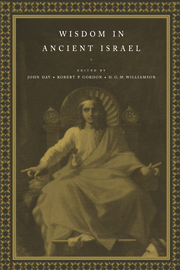Book contents
- Frontmatter
- Contents
- List of abbreviations
- Introduction
- Part 1 The ancient near eastern setting
- Part 2 Old Testament and Apocryphal texts
- 4 Foreign Semitic influence on the wisdom of Israel and its appropriation in the book of Proverbs
- 5 The limits of theodicy as a theme of the book of Job
- 6 Qoheleth
- 7 A house divided: wisdom in Old Testament narrative traditions
- 8 Wisdom in Solomonic historiography
- 9 Amos and wisdom
- 10 Hosea and the wisdom tradition: dependence and independence
- 11 Isaiah and the wise
- 12 Jeremiah and the wise
- 13 The wisdom psalms
- 14 Wisdom and Daniel
- 15 Ecclesiasticus: a tract for the times
- 16 The Christian use and the Jewish origins of the Wisdom of Solomon
- Part 3 Themes
- Biographical note: John Adney Emerton
- Bibliography of the works of John Adney Emerton
- Indexes
- Principal biblical and apocryphal references
13 - The wisdom psalms
Published online by Cambridge University Press: 16 October 2009
- Frontmatter
- Contents
- List of abbreviations
- Introduction
- Part 1 The ancient near eastern setting
- Part 2 Old Testament and Apocryphal texts
- 4 Foreign Semitic influence on the wisdom of Israel and its appropriation in the book of Proverbs
- 5 The limits of theodicy as a theme of the book of Job
- 6 Qoheleth
- 7 A house divided: wisdom in Old Testament narrative traditions
- 8 Wisdom in Solomonic historiography
- 9 Amos and wisdom
- 10 Hosea and the wisdom tradition: dependence and independence
- 11 Isaiah and the wise
- 12 Jeremiah and the wise
- 13 The wisdom psalms
- 14 Wisdom and Daniel
- 15 Ecclesiasticus: a tract for the times
- 16 The Christian use and the Jewish origins of the Wisdom of Solomon
- Part 3 Themes
- Biographical note: John Adney Emerton
- Bibliography of the works of John Adney Emerton
- Indexes
- Principal biblical and apocryphal references
Summary
All the other chapters in this part of the volume deal with specific texts. To write about ‘the wisdom psalms’ is a different proposition, somewhat akin to making bricks without straw, for there is no scholarly agreement at all about the number or the identity of such psalms, or even about the existence of such a category. One of the main reasons for this lack of consensus is the ambiguity of the terminology – not only of‘wisdom’ and ‘psalm’, but also of other terms which have had a place in the discussion such as ‘cult’ and ‘school’. The object of the present contribution is not to add one more to the many attempts to identify the wisdom psalms in the Psalter, but to reconsider the question ‘What is a wisdom psalm?’ and to discuss the function of those psalms which have been, rightly or wrongly, so designated.
The existence in the Psalter of a number of psalms having an especial affinity with the concept of‘wisdom’ supposedly to be found in the books of Proverbs, Job and Ecclesiastes was postulated by Hermann Gunkel. Gunkel recognized, however, that they do not constitute a Gattung like the other types of psalm which he identified: that is, that they have no distinctive form of their own, but can only be distinguished by other criteria. Their purpose was didactic, and they had from the first no connection with public worship in the temple as did the other kinds of psalm.
- Type
- Chapter
- Information
- Wisdom in Ancient Israel , pp. 152 - 160Publisher: Cambridge University PressPrint publication year: 1995
- 8
- Cited by



